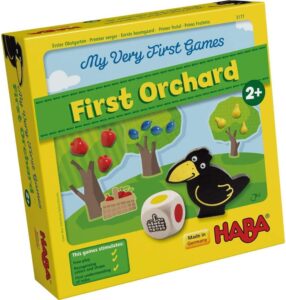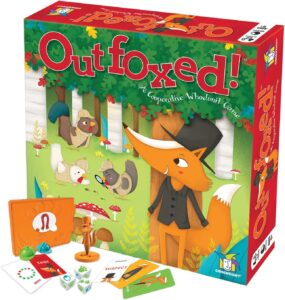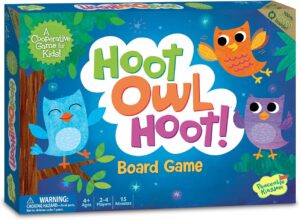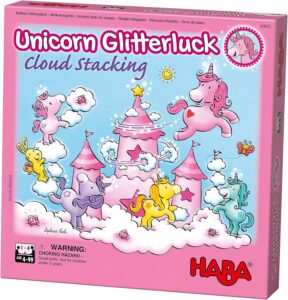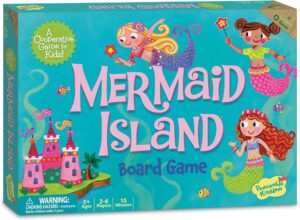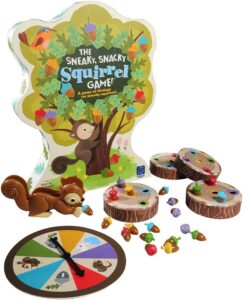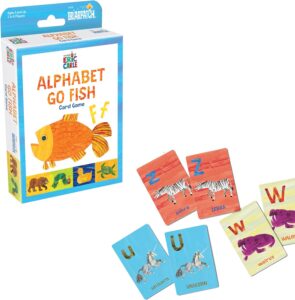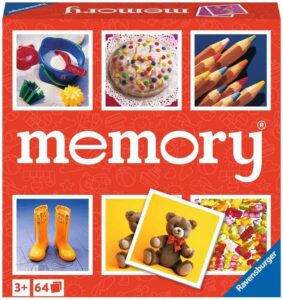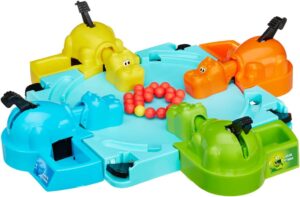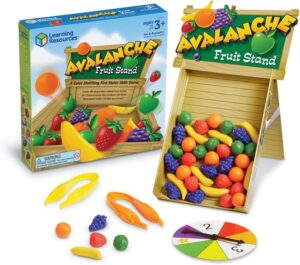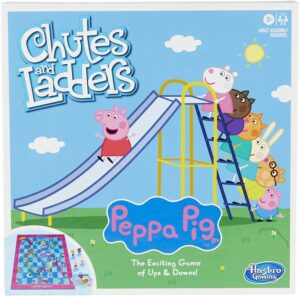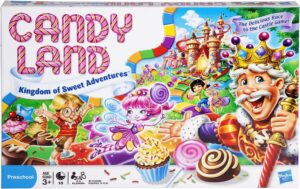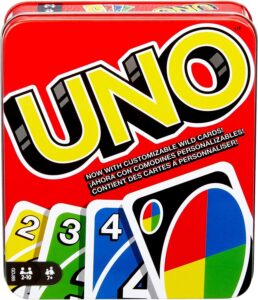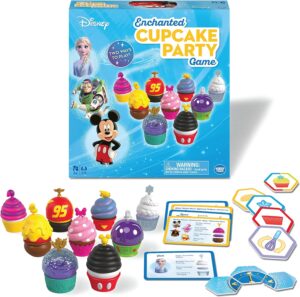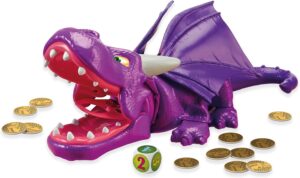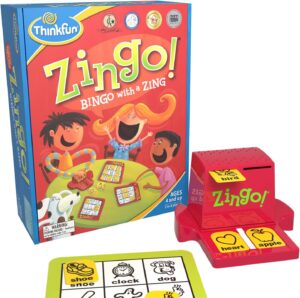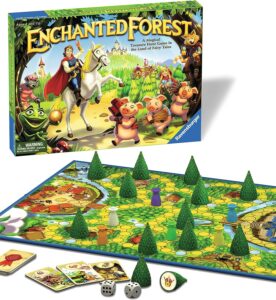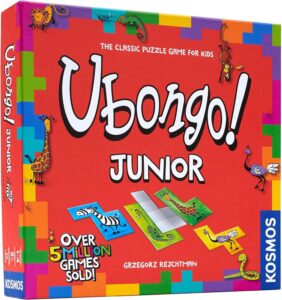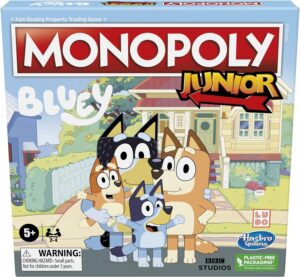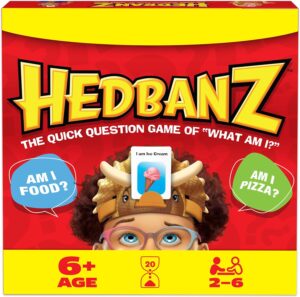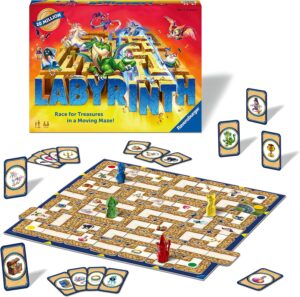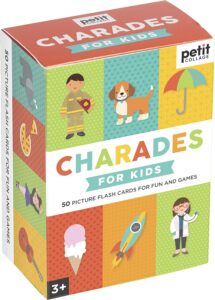the benefits of board games
Unplugged playtime: The benefits of board games and what to choose
Welcome to a world where giggles, strategy, and family bonding collide – the world of board games!
In a time where screens sometimes dominate our children’s attention, board games offer a great alternative. And there are so many reasons why people have been playing them for centuries.
Let’s explore why playing board games is more than just a fun pastime; it can be a crucial building block for your child’s development.
Cognitive skills: Building minds, one move at a time
Board games are more than just a roll of the dice or a spin of the wheel; they’re a captivating way to stimulate your child’s cognitive development.
Games like Memory, Chess, or Scrabble encourage critical thinking, problem-solving, and memory retention.
It’s also a fun way to sneak in some math practice without them even realizing it. Counting spaces, adding up scores, and managing resources are all part of playing board games.
As your little ones count, strategize and plan their moves, they might be laying the foundation for future academic success.
Social skills: A lesson in fair play and cooperation
Board games are an amazing way to introduce your child to the world of social interaction. From learning to take turns to practicing good sportsmanship, they’ll be gaining crucial life skills while having an absolute blast.
Games like Candy Land and Chutes and Ladders teach them to navigate the emotional highs and lows of competition, fostering emotional intelligence and resilience.
By the way gracefully accepting wins and losses is really hard! And in our house we’re not completely there yet. But even with a tantrum here or there, it’s a fun and important learning journey. So keep on practicing (just like with veggies)!
Communication: From words to winning strategies
Board games serve as a language playground for children, allowing them to express themselves, ask questions, and articulate their thoughts.
Whether it’s negotiating a trade in Monopoly or describing a hidden picture in Guess Who?, these games enhance language development and communication skills. The bonus? You get a front-row seat to witness the blossoming of your child’s communication prowess.
Creativity unleashed: The board as a canvas
Board games often have imaginative themes and stories. They can spark your child’s creativity and take them on exciting adventures from the comfort of your living room.
And games like Pictionary and Dixit encourage artistic expression, allowing children to illustrate their thoughts and ideas. These creative outlets not only foster imagination but also enhance communication skills as children learn to convey their concepts visually.
Attention: Hocus Pocus – Focus
In our fast-paced world, kids are bombarded with distractions. Board games help improve attention spans and focus, which can be incredibly beneficial in all aspects of life.
Fine motor skills: Dice rolls and card holds
Those small movements of picking up a card, moving a game piece, or rolling the dice might seem insignificant, but they play a vital role in fine motor skill development. These seemingly simple actions refine hand-eye coordination and dexterity, preparing little hands for more intricate tasks as they grow.
Family bonding: Quality time and just plain fun
We love a good movie night, but in a world bustling with digital distractions, board games offer a chance to unplug and connect as a family on a different level.
Whether it’s a cozy night in or a lazy Sunday afternoon, laughing with your kids and creating memories around the game table creates a strong sense of family identity. It’s a reminder that the best moments in life are often the simplest ones.
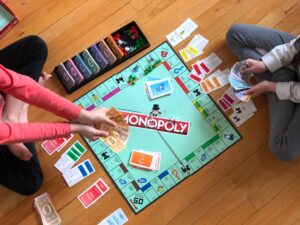
Now that you know all the great ways your little one can benefit from playing board games, you’ll have to decide what kind of game you want to play.
One key decision you’ll encounter is choosing between competitive and cooperative games. Both styles offer unique benefits, but understanding the differences can help you tailor your child’s gaming experience to their developmental needs and preferences.
Cooperative board games: Teamwork makes the dream work
Cooperative board games like Hoot Owl Hoot! or The Orchard emphasize collaboration, with players working together towards a shared objective. The game itself is the common adversary, and everyone wins or loses together.
Benefits of cooperative games
Teamwork and Communication:
Cooperative games foster teamwork and communication skills as players collaborate to achieve a common goal.
Emotional Intelligence:
Children learn about empathy, cooperation, and shared responsibility by experiencing wins and losses as a team.
Reduced Stress:
Since everyone wins or loses together, there’s less individual pressure, making cooperative games great for fostering a positive gaming experience.
Competitive board games: The thrill of friendly rivalry
Competitive board games like Candy Land or Connect 4 involve players competing against each other to achieve a specific goal, whether it’s collecting the most points, reaching a destination first, or outsmarting opponents.
Benefits of competitive games
Healthy Competition:
Competitive games teach children about friendly competition, encouraging them to strive for success while respecting others’ efforts.
Strategic Thinking:
Little ones develop strategic thinking and decision-making skills as they plan moves to outwit opponents.
Rules and Structure:
Competitive games often have clear rules, helping children understand the importance of structure and fair play.
Choosing the right fit
The choice between competitive and cooperative games ultimately depends on your child’s personality, preferences, and developmental stage. Some children thrive on the excitement of competition, while others find joy in shared victories and collaborative problem-solving.
I found that cooperative games that emphasize teamwork are a great way to introduce board games to younger children, while slightly older kids might enjoy the challenge of competitive play.

In the end, whether competing for victory or collaborating for a shared triumph, these seemingly unassuming boxes hold treasures of learning, laughter, and love.
So, dust off those board games, clear the table, and let the games begin – for in each roll of the dice and every card played, your child is not just having fun; they’re growing, one move at a time.
Cheers to the magic of unplugged playtime!
Here is a quick list of our favorite board games.
Cooperative games:
Competitive games:
And some of our all-time favorites, you can play cooperative or competitive:
DISCLAIMER: As an Amazon Associate I earn from qualifying purchases.
Read the full disclosure policy here.

all about play
Playing is your kids most important job!
Learn why and see how we like to play in these posts.
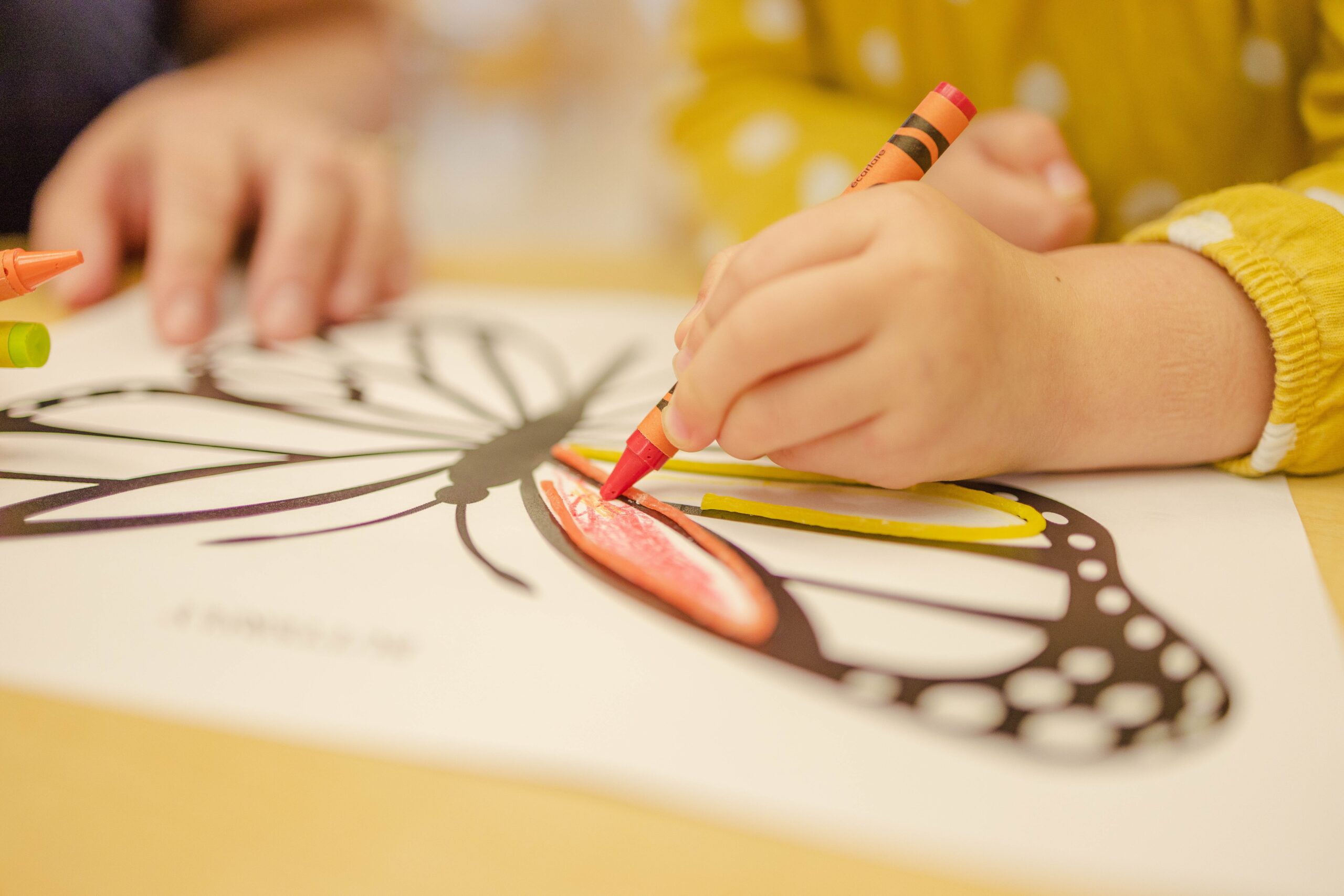
activities & inspiration
Let's get hands on!
Kids will love the crafts, games, sensory play ideas and more that you will find here.

favorite toys
Toys are the tools to unlock your child's imagination!
Find out about our favorite toys and why we love them.

